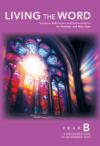Understanding the Word
By Br. John R. Barker, OFM
Pentecost comes from the Greek word for the Jewish Festival of Weeks, which took place fifty days after Passover. By the first century, this ancient harvest festival was also a time for Jews to celebrate the Noahic covenant, which God made through Noah with “every living creature” after the flood (Genesis 9:1–17). In the scene from Acts, Jews from all over the world represent the universal scope of this covenant and of God’s dominion and care. It is no surprise, then, that the Holy Spirit descends at Pentecost, bestowing on the church the power to spread the gospel to the ends of the earth. The
tongues of fire and the driving wind are classic biblical images of divine theophany, in which the powerful and life-changing power of God descends into the world to set it on a new course.
In his letter to the Romans, Paul has been exploring the dilemma all faithful humans find themselves in: while wanting to live within God’s will, they nevertheless continually encounter a “flaw” in their human nature that resists God’s will and seeks selfish desires instead. This flaw Paul calls “the flesh.” The divine solution to this dilemma is Christ, in whom the flesh is crucified, and who bestows on the baptized his Spirit. Paul uses the language of debt to make his point. Christians “owe” nothing to the flesh; they are not “slaves” to it, such that they must do what it demands. In the Spirit, they are free children of God who can, if they wish, refuse the demands of the flesh. In doing so—even when it involves great struggle—they show themselves to be God’s children and heirs with Christ to his glory.
In his Last Supper discourse, Jesus assures his disciples that although he is returning to the Father, he will not abandon them. If they are faithful to him by heeding his commandments (the primary one being to love one another as he has loved them [John 13:34–35]), he will ask the Father to send the Advocate, or paracletos. This Greek term, drawn from the legal world, means an intercessor, spokesperson, comforter. All of these roles describe that of the Spirit, who will also teach the disciples and ensure their fidelity to Jesus’ teaching. Thus Jesus has equipped his followers to carry on his work by modeling his love for others and by faithfully teaching in his name.
